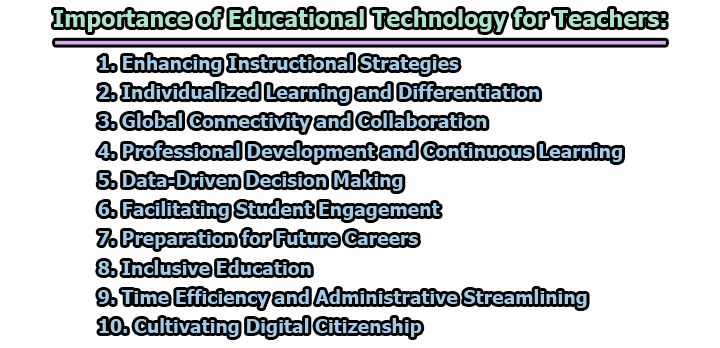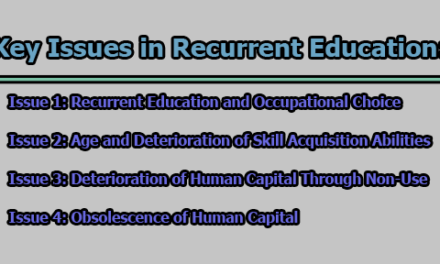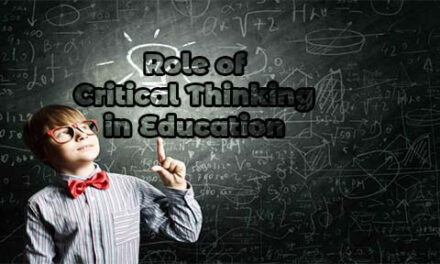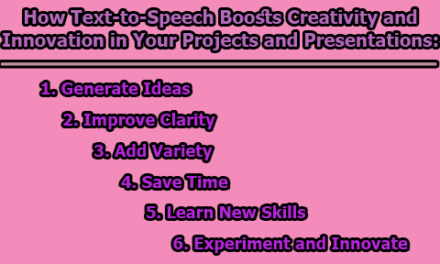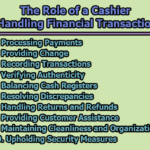Importance of Educational Technology for Teachers:
In the ever-evolving landscape of education, the integration of technology has become indispensable for both students and educators. Educational technology, often abbreviated as EdTech, encompasses a wide array of tools and resources designed to enhance the teaching and learning experience. This article explores the importance of educational technology for teachers, shedding light on its transformative potential and its role in navigating the challenges of the 21st-century classroom.
1. Enhancing Instructional Strategies: One of the primary benefits of educational technology for teachers lies in its ability to augment instructional strategies. Traditional teaching methods are no longer sufficient in preparing students for the complexities of the modern world. EdTech tools offer diverse avenues for delivering content, catering to various learning styles and preferences. Whether through interactive presentations, simulations, or multimedia resources, teachers can engage students in ways that stimulate critical thinking and creativity.
2. Individualized Learning and Differentiation: Educational technology allows for a more personalized approach to learning, addressing the diverse needs of students within a single classroom. Through adaptive learning platforms, teachers can tailor instructional content based on individual student performance and pace. This level of differentiation is challenging to achieve without technology, as it enables educators to provide targeted support to struggling students while allowing advanced learners to progress at their own speed.
3. Global Connectivity and Collaboration: The digital era has transformed the world into a global village, and education is no exception. Educational technology facilitates global connectivity and collaboration, breaking down geographical barriers. Teachers can connect their students with peers from around the world, fostering cross-cultural understanding and collaboration on projects. Virtual classrooms, video conferencing, and collaborative online platforms empower educators to prepare students for a future where international collaboration is the norm.
4. Professional Development and Continuous Learning: Staying abreast of the latest educational trends and methodologies is crucial for teachers to remain effective in their roles. Educational technology provides avenues for professional development, enabling teachers to engage in online courses, webinars, and collaborative platforms. Through these resources, educators can update their skills, learn about innovative teaching practices, and connect with a global network of professionals, ultimately enhancing the quality of education they provide.
5. Data-Driven Decision Making: In the digital age, data is a powerful tool for informed decision-making. Educational technology platforms often come equipped with analytics and reporting features that allow teachers to track student progress, identify areas of difficulty, and assess the effectiveness of instructional strategies. By leveraging data, teachers can make informed decisions on adjusting their teaching methods, providing targeted interventions, and continuously improving the learning experience for their students.
6. Facilitating Student Engagement: Keeping students engaged is a perennial challenge for educators. Educational technology provides a repertoire of interactive tools and platforms that captivate students’ attention and make learning more enjoyable. Gamification, virtual reality, and educational apps are just a few examples of how technology can transform traditional lessons into engaging and immersive experiences. By making learning enjoyable, teachers can foster a positive attitude towards education and cultivate a love for lifelong learning.
7. Preparation for Future Careers: As we move further into the 21st century, the skills required for the workforce are rapidly evolving. Educational technology equips teachers with tools to impart not only subject-specific knowledge but also crucial 21st-century skills such as critical thinking, communication, collaboration, and digital literacy. By integrating technology into their classrooms, teachers can better prepare students for the demands of future careers in an increasingly digital and interconnected world.
8. Inclusive Education: Educational technology plays a pivotal role in fostering inclusive education by addressing the diverse learning needs of students. For students with disabilities, technology offers assistive tools and applications that cater to individual requirements, ensuring that no one is left behind. Furthermore, it provides avenues for language translation, making educational content accessible to students from diverse linguistic backgrounds.
9. Time Efficiency and Administrative Streamlining: Teachers often find themselves burdened with administrative tasks that consume valuable instructional time. Educational technology can streamline administrative processes, from grading and attendance tracking to lesson planning and communication with parents. By automating routine tasks, teachers can focus more on actual teaching and building meaningful connections with their students.
10. Cultivating Digital Citizenship: In an era dominated by digital communication, cultivating digital citizenship is an essential aspect of education. Educational technology allows teachers to guide students on responsible and ethical use of digital resources. Through lessons on internet safety, information literacy, and responsible online behavior, educators can empower students to navigate the digital world responsibly.
In conclusion, the integration of educational technology into classrooms is not a mere trend; it is a necessity in preparing students for the complexities of the 21st century. However, its impact extends beyond the students to the very heart of education – the teachers. Educational technology empowers teachers to be facilitators of learning, providing them with tools to enhance instruction, personalize learning experiences, and cultivate essential skills in their students. As technology continues to advance, educators must embrace these tools as invaluable allies in their mission to nurture the minds of the future. By doing so, teachers can harness the transformative power of educational technology and navigate the challenges of the modern classroom with confidence and innovation.

Former Student at Rajshahi University

